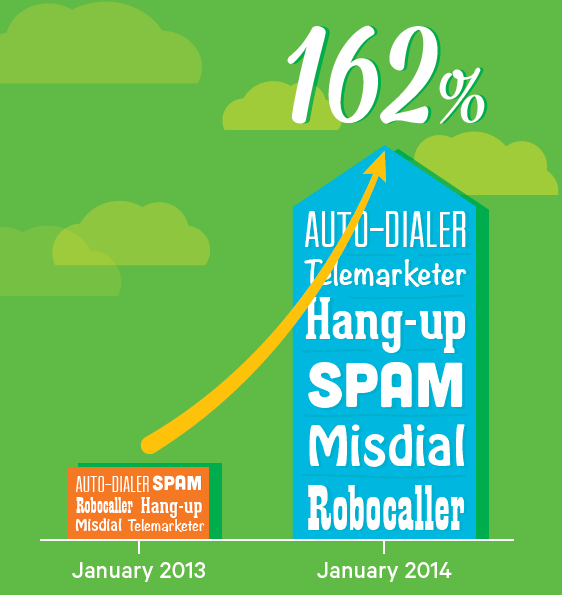Spam phone calls cost US small businesses half a billion dollars in lost productivity

Spam callers are an unending source of frustration for many of us and a waste of our time. But the problem is growing and growing according to new data published this week.

Marchex Inc. is a mobile advertising technology company from Seattle WA. It aggregated data from nearly 40 million phone calls blocked to US small businesses using its Clean Call technology during 2013. The findings show:
Although the federal government's national Do Not Call Registry may offer consumers some relief from spam, it leaves businesses exempt and unprotected.
The volume of detected and blocked calls jumped 162 percent from January 2013 to January 2014 and is on track to keep rising with the mass adoption of mobile phones.
Technology has made it cheaper and easier for spammers to blast out up to tens of thousands of phone calls in a matter of minutes.
The average spam call lasts two minutes. That is due in part to spammers using more deceptive practices to keep businesses on the phone for longer.
Marchex has found spammers range from computerized “robocallers” to fraudsters known as "chipmunks." Chipmunks calls have shrill, altered voices. These callers try to keep the recipient on the phone for 30 seconds.
You pick up the phone and hear a fast paced high pitched voice asking you random questions. The calls are intended to manipulate metrics in click-to-call campaigns. If businesses stay on the phone for 30 seconds or more the call is considered to be a "good" customer call.
Usually if a seller can keep you on the phone for more than 30 seconds, it signals a strong intent to buy. The advertiser pays the call centre for the success of the campaign, measured by call length but in reality there has been no increase in sales.
Small businesses are more dramatically impacted than large national businesses, which can direct incoming calls at scale through call centers. Answering spam calls wastes nearly 20 million hours a year for small businesses in the US - which translates to about $475 million annually.
Marchex started aggressively going after spam calls in 2011, after noticing the detrimental effect these calls were having on businesses.
Its technology is used by hundreds of thousands of advertisers, and is invisible to the consumer. The algorithms detect and block telemarketer, robocallers and other spam diallers and are regularly updated.
"Unlike spam emails, which can be ignored, spam calls are highly disruptive and costly for businesses that rely on phone calls for sales" said Jason Flaks, Director of Product and Engineering at Marchex.
"This growing epidemic hits small businesses the hardest. Fortunately, there are now solutions to address the problem head-on. Small businesses are vital to our national economy and they can now take steps to reduce the amount of unwanted calls they get" Flaks said.
"We will continue to innovate with new technologies to stop spam from wasting valuable time for business owners and their employees."
Small businesses can protect themselves from spam callers by following these tips. Ask suspected spammers to immediately identify themselves and the reason for their call, request to be put on the telemarketer's internal "do not call" list and finally, hang up if a caller won't get off the line.
Spam callers will not be going away anytime soon but what we can do is to change the way we deal with them?
How do you deal with nuisance spam callers that invade your time and blight your day? I’d love some new tips to use on my own callers.